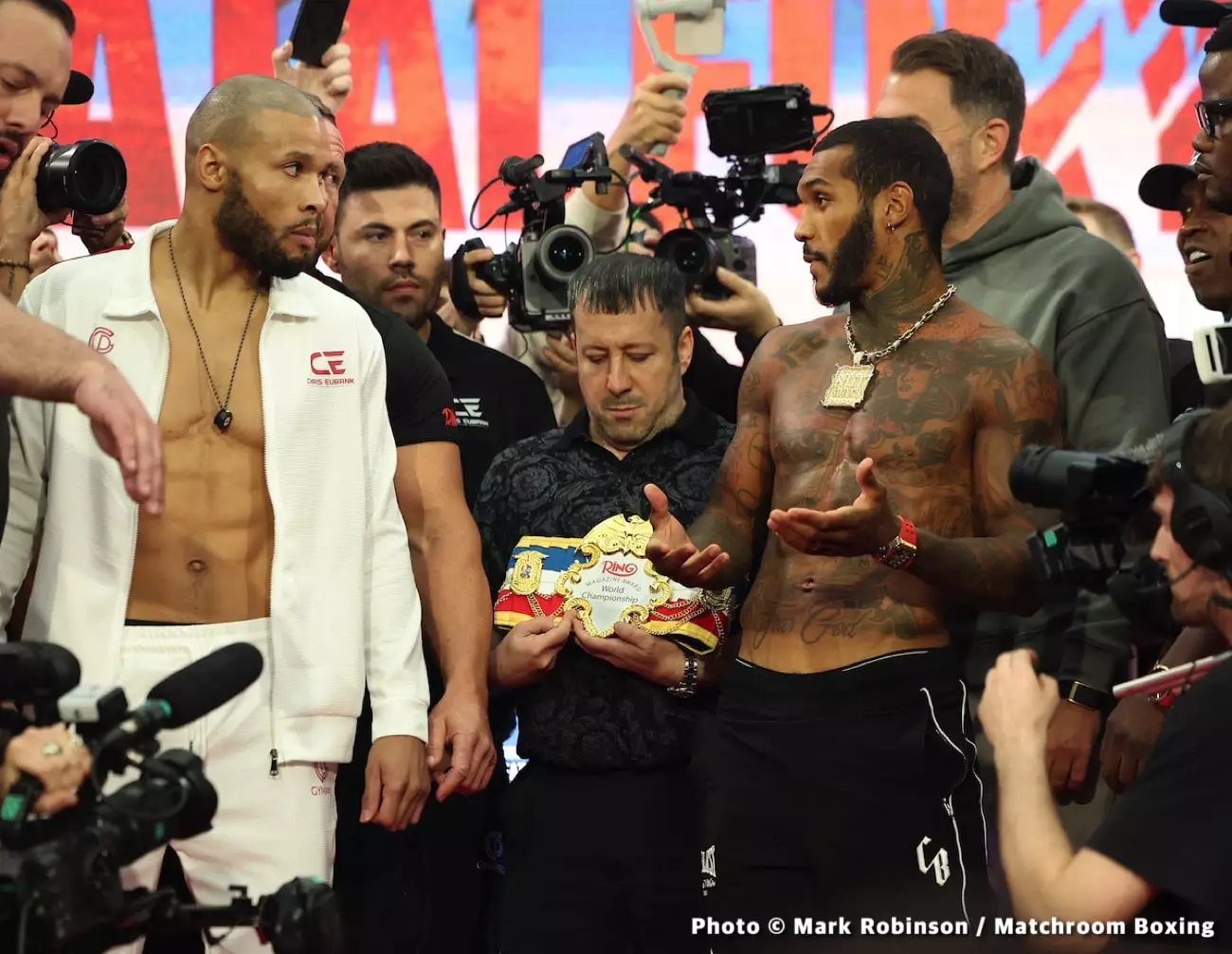Chris Eubank Jr.’s recent skirmish with the scales has morphed into a charged drama that extends beyond the boxing ring. The middleweight contender was hit with a staggering fine of $500,000 for coming in half an ounce over the 160-pound limit ahead of his highly anticipated bout against Conor Benn. Eubank Jr. visibly seethed as he expressed his discontent, insisting that the severe financial penalization is not just excessive but characteristically indicative of what he perceives to be a shady business environment fostered by boxing promoter Eddie Hearn and his company, Matchroom. The outrage isn’t merely centered on the fine itself but rather on the perception of exploitation and the pressures surrounding modern professional boxing.
Eubank Jr. stated, “If they’re going to take half a million off me for being 0.5 over the limit, then that’s just what it is.” This statement encapsulates his sentiment that he is facing an unjust monetary punishment for a superficial infraction, a sentiment resonant within many in the boxing community. Industry insiders and fans alike must scrutinize the validity of such steep fines in a sport already marred by controversies of fairness and ethics. It raises questions: Is $500,000 truly a reasonable sanction for a marginal misstep, or is it a manifestation of a weighted system that disproportionately punishes fighters struggling to maneuver through the complex realms of contractual obligations and promotional pressures?
The Role of Promotions: An Unequal Playing Field?
In the world of boxing, promotional companies wield immense power, often dictating terms that may not always align with the fighters’ best interests. Eubank Jr.’s words offer insight into a pervasive sentiment among athletes feeling cornered by these organizations. He suggests that the repercussions of his misstep were inflected by Hearn and Matchroom, further drowning the fighters in a sense of hopelessness when contesting corporate decisions. Instead of channeling their energy into intense training and performance, athletes must navigate a labyrinthine bureaucratic reality that subjects them to penalties that can derail their careers.
Eubank Jr.’s impending match against Conor Benn is emblematic of this larger issue in boxing: the seemingly relentless push for financial penalties that undermine the fighters’ focus and integrity. Here lies the crux of Eubank’s argument: if the mere act of weighing in slightly over a limit can result in economic quicksand, how can fighters tune their minds to the fight ahead? With each dollar forfeited reverberating as a sign of a flawed structure, the sport faces vital scrutiny.
Channeling Anger into Performance
Despite the high drama surrounding the weight controversy, Eubank Jr. appears resolute in his battle-ready mindset as he approaches the fight against Benn. “Weights have no relevance to what happens tomorrow night,” he asserted, indicating that despite external distractions—including arbitrary penalties—his focus remains undeterred. A critical facet of athletic prowess often hinged on mental fortitude reveals itself in this assertion. Eubank Jr. is not allowing the emotionally charged circumstance of the weight penalty to cloud his performance or preparation.
What’s compelling about Eubank Jr.’s perspective is how he intends to channel his outrage directed towards the fine into an aggressive performance against Benn in the ring. His sentiments create a narrative where the anger morphs into fuel for determination. He claims, “He’s in for a hell of a surprise,” signaling that not only does he plan to deliver a physically dominating performance, but he also aims to extract retribution for the perceived injustices faced in the lead-up to the match. There is a poetic justice in transforming adversity into a drive for victory, an angle that fans find deeply compelling.
A Fight Beyond the Ring
As Eubank Jr. readies himself to face Benn amidst the backdrop of financial controversy, the stakes have shifted from mere victory to a confrontation with larger systemic issues in the sport. Boxing—often celebrated for its raw authenticity—represents a battleground not just for athletes, but also for a reexamination of promotional ethics and fighter treatment. Eubank Jr. embodies the struggles faced by many in combat sports, fighting both in the ring and against an industry that frequently prioritizes profits over principles.
In this charged atmosphere, one thing becomes clear: The fight extends far beyond the canvas floors of the ring, mingling with deep-seated questions about fairness, integrity, and the direction of professional boxing itself. Eubank Jr.’s tale is not merely one of weight but of warriors battling the scale’s unyielding grip on their fates and futures. The narratives around this fight demand attention, as they signify important dialogues about the relationships between fighters, promoters, and the very foundations of the sport.

